Don't wanna be here? Send us removal request.
Text
The Future of Retail: Predictive Analytics through Microsoft Fabric
The difference between struggling and thriving in today's retail environment comes down to one thing: using your data effectively. Every transaction, every customer interaction, and every inventory movement contains valuable insights that retail data solutions in Microsoft Fabric can transform into predictions that drive profitability. This platform isn't just another tool for forward-thinking retailers—it's becoming essential infrastructure.

Retail Data Solutions in Microsoft Fabric
Microsoft Fabric for Retailers provides an end-to-end analytics platform that unifies data from multiple sources—point of sale systems, e-commerce platforms, inventory management, and customer loyalty programs. This integration creates a single source of truth that retailers can depend on for accurate forecasting and strategic planning.
The platform's predictive capabilities enable retailers to anticipate customer needs rather than simply react. By analyzing historical sales data alongside external factors like seasonality, weather patterns, and local events, Fabric for the Retail Industry helps businesses forecast demand with remarkable precision.
Key Benefits of Microsoft Fabric in Retail
1. Enhanced Inventory Management
Predicts optimal stock levels based on historical patterns
Reduces carrying costs while preventing stockouts
Forecasts demand variations by location, time, and season
Alerts managers to potential overstocking situations
Optimizes product allocation across multiple stores
2. Personalized Customer Experiences
Analyzes shopping behavior across all channels
Identifies individual customer preferences and patterns
Enables targeted marketing with higher conversion rates
Predicts future purchase needs for proactive recommendations
Creates cohesive experiences between online and in-store shopping
3. Dynamic Pricing Optimization
Monitors competitor pricing in real-time
Adjusts prices based on demand, inventory levels, and market conditions
Identifies optimal promotional timing and discount levels
Preserves margins while maintaining competitive positioning
Tests pricing strategies through predictive modeling
4. Operational Efficiency
Optimizes staff scheduling based on predicted customer traffic
Enables predictive maintenance for store equipment
Streamlines supply chain with more accurate forecasting
Reduces waste through better demand prediction
Improves resource allocation across all business functions
Real-World Application
PreludeSys helped a leading U.S. convenience store chain turn data chaos into clarity with Microsoft Fabric. By replacing manual reports and disconnected systems with centralized storage, seamless integration, and AI-driven insights, our experts helped the company cut reporting time by 20% and sharpen their revenue forecasts. Real-time dashboards gave teams the visibility they needed to make faster, smarter decisions — showing just how powerful Microsoft Fabric can be. With the right partner and tools, retailers can turn their data into a powerful growth engine.
Getting Started with Microsoft Fabric
Your journey to predictive retail excellence begins with a single step. Microsoft Fabric services offer flexible implementation options that align with your current capabilities while building toward your future goals. The platform grows alongside your analytics maturity, providing immediate value while enabling long-term transformation. With Microsoft Fabric services, you can harness the power of data to create a seamless retail ecosystem where forecasting is flawless, personalization is second nature, and every data point unlocks new possibilities. Talk to our experts today and start building a retail ecosystem that drives success.
#Retail Data Solutions in Microsoft Fabric#microsoft fabric consulting#microsoft fabric consulting company#microsoft fabric services#microsoft fabric consulting services#microsoft fabric
0 notes
Text

PreludeSys helps businesses navigate complex transitions like moving from Power BI Premium to Microsoft Fabric. Our tailored Microsoft Fabric services ensure a seamless migration process, providing your organization with the full benefits of this powerful data platform. Whether you need assistance with workspace reassignment, license management, or understanding how to maximize the capabilities of Microsoft Fabric, we’ve got you covered.
To know more visit us - https://preludesys.com/power-bi-premium-to-fabric-transition/
#transition power bi to fabric#power bi to fabric migration#power bi premium to microsoft fabric migration#microsoft fabric services
0 notes
Text
Making the Leap: Power BI to Microsoft Fabric Migration – What You Need to Know
If you’re a Power BI enthusiast or an organization relying heavily on Power BI services, you’ve likely heard the buzz about Microsoft Fabric services—the next evolution of Microsoft’s data ecosystem. Fabric isn’t just a new tool; it’s a game-changing platform designed to unify data integration, analytics, and governance in a single, seamless environment.
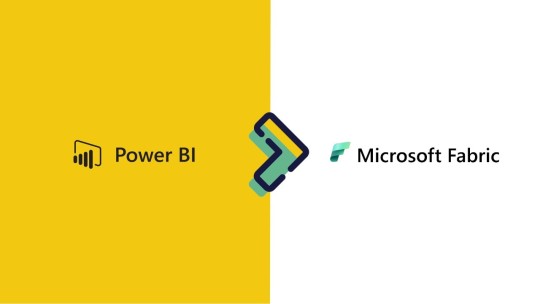
So, why should you consider migrating from Power BI to Microsoft Fabric? And how can a Power BI implementation partner or a Microsoft Fabric consulting company help ensure a smooth transition? Let’s dive in.
Why Migrate to Microsoft Fabric?
Power BI has been a trusted tool for business intelligence and reporting, but as data ecosystems grow increasingly complex, organizations need more than just dashboards. Enter Microsoft Fabric—a unified data platform that brings together tools for data integration, data governance, and analytics.
1. Unified Data Ecosystem
Fabric combines the power of Power BI, Azure Synapse, and Data Factory into one cohesive platform. This integration eliminates data silos and creates a streamlined, collaborative environment.
2. Scalability for Modern Data Needs
Fabric’s scalable architecture supports massive data volumes while ensuring top-notch performance. Whether you're dealing with IoT data streams or complex machine learning pipelines, Fabric handles it all.
3. Enhanced Data Governance and Compliance
With built-in tools like Azure Purview, Fabric simplifies compliance with regulations such as GDPR and HIPAA. As data governance consultants, we’ve seen businesses struggle with fragmented compliance tools—Fabric offers a unified solution.
4. AI and Automation at Scale
Fabric is built with AI at its core. From automating data pipelines to enabling advanced analytics, Fabric empowers businesses to derive insights faster and smarter.
What Does Migration Involve?

Transitioning from Power BI to Microsoft Fabric isn’t a simple "lift and shift." It’s about reimagining how you manage, process, and analyze data. Here’s what you need to know:
1. Assessment of Current Workloads
Evaluate your current Power BI environment.
Identify dependencies on Azure integration services, SQL Server migration, or data engineering services.
2. Modernizing Data Pipelines
Fabric’s data integration service allows you to modernize and centralize pipelines, ensuring seamless connectivity across multiple data sources.
Partner with a data modernization consulting company like PreludeSys to realign your pipelines with Fabric’s medallion architecture.
3. Upgrading Reporting and Dashboards
Fabric enhances Power BI’s capabilities with real-time dashboards and AI-powered insights.
Our business intelligence consulting services ensure your dashboards leverage Fabric’s advanced features for maximum impact.
4. Ensuring Governance and Security
Fabric’s deep integration with data compliance services like Purview ensures robust governance frameworks.
We provide data governance consulting services to help you implement policies that protect data while enabling agility.
How PreludeSys Can Help
Migrating to Microsoft Fabric may feel like a daunting task, but it doesn’t have to be. With a trusted partner like PreludeSys, a Microsoft Fabric consulting company and Power BI implementation partner, you’ll have access to a team of experts who specialize in:
Data Modernization Services: Modernize your data architecture with Fabric’s medallion framework, ensuring scalability and flexibility.
Cloud Migration Services: Move workloads to Azure seamlessly, reducing downtime and ensuring performance.
Data Integration Consulting Services: Consolidate fragmented data into Fabric for a single source of truth.
Power BI Consulting Services: Transform your existing Power BI reports into Fabric-ready, AI-driven dashboards.
Data Governance Services: Implement governance frameworks that align with industry standards and regulations.
Benefits of Power BI to Fabric Migration
The benefits of migrating to Microsoft Fabric extend far beyond enhanced analytics:
1. Faster Decision-Making
Real-time data processing and analytics empower businesses to act on insights instantly.
2. Reduced Costs
By centralizing your data ecosystem, Fabric eliminates the need for multiple tools, driving cost efficiencies.
3. Future-Proofing Your Business
Fabric’s integration of AI and low-code tools ensures your data platform evolves with emerging technologies.
A Seamless Migration Journey Awaits
Migrating from Power BI to Microsoft Fabric is not just a technical upgrade—it’s a strategic move to future-proof your data ecosystem. By partnering with PreludeSys, you gain access to the expertise of a data engineering consulting services provider, ensuring a smooth and successful transition.
Are you ready to make the leap to Microsoft Fabric? Let us guide you every step of the way. Contact us today to learn more.
#microsoft fabric services#power bi premium to fabric transition#transition power bi to fabric#convert power bi premium p1 to fabric#microsoft fabric consulting#microsoft fabric consulting company#fabric for power bi users#powre bi premium p1 transition to fabric#power bi consulting services
0 notes
Text
Microsoft Fabric Benefits | PreludeSys

Microsoft Fabric services provide a comprehensive suite of tools designed to streamline data management, analytics, and business intelligence.
By integrating advanced data engineering, machine learning, and data visualization capabilities, Microsoft Fabric enables organizations to harness the full potential of their data. Its seamless collaboration features promote cross-functional teamwork, while robust security ensures compliance with industry standards. With Microsoft Fabric services, businesses can accelerate decision-making, improve data accessibility, and drive innovation.
This unified platform eliminates data silos, allowing for efficient workflows and real-time insights, making it an indispensable asset for companies striving to excel in a data-driven digital landscape.
For more visit us - https://preludesys.com/microsoft-fabric/
0 notes
Text
Microsoft Fabric - Unlocking Data’s True Potential
As the world faces an explosion of data, businesses are under increasing pressure to find intelligent, unified solutions to harness its value. Microsoft Fabric is one such solution, promising to address complex data challenges in industries like healthcare, manufacturing, and logistics. But what does this platform truly offer? Let’s explore how Microsoft Fabric can transform the way businesses approach their data strategy.
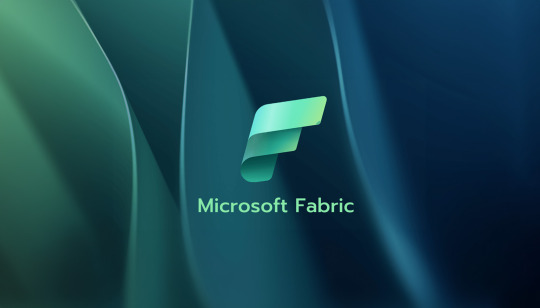
Tackling Industry-Specific Challenges with Fabric
Every industry grapples with its own unique data challenges. For manufacturers, data silos across departments like production, quality control, and logistics prevent companies from leveraging data for comprehensive decision-making. Healthcare faces its own hurdle: fragmented patient records that make it harder for providers to deliver timely, personalized care.
Microsoft Fabric stands out by unifying data, providing one cohesive platform where businesses can centralize and analyze data from across departments. This integrated approach makes data actionable, offering insights that directly tackle the specific challenges of each industry. Companies leveraging Microsoft Fabric consulting can better customize these solutions to meet their unique needs, accelerating the path to optimized data strategies.
Real-World Use Cases & Measurable Benefits
Predictive Maintenance in Manufacturing Manufacturers can collect real-time data from IoT sensors across their equipment to monitor the health of machinery. With Microsoft Fabric services, companies can employ predictive analytics to foresee maintenance needs, reducing unplanned downtime by 30% and cutting maintenance costs by 25%. This data-driven approach not only saves money but ensures that production lines stay operational with minimal interruptions.
Enhanced Patient Care in Healthcare In healthcare, unifying patient data is a game-changer. With Microsoft Fabric, healthcare providers can consolidate patient records from various departments and external sources, enabling them to offer more personalized and timely care. As a result, providers have seen a 20% increase in patient satisfaction scores, thanks to faster response times and more informed decision-making.
Bridging Data Gaps with Integration
Microsoft Fabric service integrates with critical tools like Power BI, SQL databases, and machine learning models, making it easier to unify data sources. This allows businesses to draw insights across platforms without needing to overhaul existing systems.
For instance, a manufacturing company can leverage Fabric to combine IoT data from production equipment with inventory data, enabling real-time insights into stock levels and machinery health. This integration supports proactive restocking and maintenance, helping maintain consistent production schedules. In healthcare, Fabric can unify patient data from wearables and electronic medical records, offering a comprehensive patient view that improves care coordination and response times. By bridging data gaps, Fabric empowers these industries with a holistic view of operations, enhancing both efficiency and outcomes.
Prioritizing Data Governance and Compliance
For industries like healthcare, finance, and government, data governance isn’t optional—it's essential. These industries operate under strict regulations, and mishandling data can lead to severe penalties and reputational damage. Microsoft Fabric’s built-in governance features, such as role-based access, data lineage tracking, and audit trails, help businesses comply with these regulations while maintaining control over their data. By giving organizations a clear view of data access and usage, Fabric allows teams to focus on innovation rather than constantly worrying about compliance.
Future-Proofing Data Strategy with Fabric
As businesses grow, their data analysis needs become more sophisticated. Microsoft Fabric is built to scale with those needs, allowing businesses to expand data operations without starting from scratch. Whether you're adding new data sources, increasing storage, or expanding your analytics capabilities, Fabric adapts as your business grows.
Fabric's adaptability also positions it as an ideal platform for businesses looking to leverage artificial intelligence (AI) and machine learning (ML) in the future. The platform’s flexibility supports AI-driven innovations, ensuring businesses can stay competitive in a rapidly changing data landscape. Engaging with Microsoft Fabric consultants allows organizations to strategically plan for the future and ensure their data strategies evolve as their needs grow.
Conclusion
Microsoft Fabric is a powerful data platform that promises to unify and empower organizations through actionable insights, integrated data, and top-notch governance features. With its industry-specific solutions and scalable framework, Fabric equips businesses to confidently address data challenges and advance their data strategy. It’s an ideal choice for organizations ready to transform their data into a strategic asset, paving the way for growth and innovation across sectors.
Ready to transform how your organization handles data? Contact PreludeSys to explore how Microsoft Fabric can be tailored to your needs and drive measurable impact in your industry.
#microsoft fabric service#microsoft fabric services#microsoft fabric consulting#microsoft fabric consulting service#microsoft fabric consulting company
0 notes
Text
Announcing Delphix Compliance Services for Microsoft Fabric: Automating Data Compliance in Microsoft’s Next-Generation Platform
Overall, the collaboration between Delphix and Microsoft brings a wealth of value to large enterprises, providing a seamless and efficient way to achieve multi-cloud compliance while also unifying their data estate for analytics.

Today at Microsoft Build, Microsoft announced their next generation data platform, Microsoft Fabric. Delphix is proud and excited to be part of this solution and included in today’s announcement and the Microsoft Build demo session. Reflecting Microsoft and Delphix’s joint commitment to partner success and hands-on product collaboration, we collaborated on a solution to help unblock data access for wherever it’s needed across the enterprise to accelerate value generation from data — a mission tightly aligned with Delphix’s company vision. It’s been an ideal way for us to be better together, delivering the best of data compliance and data integration.
The Growing Impact of Privacy Regulations on Technology Professionals
Our customers tell us the growing framework of privacy regulations makes it harder for technology professionals who depend on sensitive data to do their jobs. For software developers, quality engineers, data analysts and scientists, AI/ML engineers, and citizen users of data, protecting privacy and complying with mandates such as GDPR and HIPAA often means relying on manual or sub-optimized processes for protecting sensitive data such as personally identifiable information (PII), customer lists, and payment details.
Unfortunately, these processes are not practical or sustainable. For one, they inevitably lead to delays in data access, hindering innovation, frustrating team members, and blocking citizen users from access to the data they need. But just as often they often fail to sufficiently protect data privacy, leaving sensitive data exposed to developers, testers, third parties, off-shore teams, systems administrators and others without a legitimate need-to-know. This is especially true with decentralized processes that are poorly governed across the enterprise. The challenge is making useful data available on demand while protecting sensitive elements from disclosure and replication.
Introducing Delphix Compliance Services for Microsoft Fabric
This is where Delphix comes into the picture. In close collaboration with Microsoft’s data integration team, we have introduced Delphix Compliance Services for Microsoft Fabric. Delphix provides intelligent, scalable, and seamless data masking for Microsoft Fabric users, allowing them to achieve multi-cloud data compliance in a way that is secure, efficient, easy-to-manage, and sustainable.
For background, Delphix software has a proven track record of masking data across Microsoft and non-Microsoft environments. We have worked with enterprises of all sizes, industries, and geographies, to address both cybersecurity requirements and privacy mandates. Critically for cloud migration use cases, our masking technology works with both non-cloud and cloud environments, helping many businesses shift their applications and data to the cloud. With this collaboration, Microsoft and Delphix are bringing our proven technology to the Microsoft Fabric platform in an experience tailored for ease-of-use and fast path to value.
Delphix Compliance Services for Microsoft Fabric provide masking APIs as a service so users can transform sensitive data to fictitious but realistic values, all from within the data flows. Like in the below diagram, you can simply call Delphix masking APIs from within your data flow, to ensure that data is compliant when being moved from Point A to Point B: you can mask and move data all in a single data flow. This approach preserves the utility of the data for analytics and BI without disclosing sensitive values such as PII. Furthermore, the solution supports the more than 170 source and target connectors provided by Microsoft’s platform and ensures referential integrity across multi-cloud environments. As a result, Delphix provides masking for even the most complex analytics scenarios.

The Benefits for Developers, Data Professionals, and Citizen Users
Delphix Compliance Services was built to make privacy compliance easy and automatic. It works seamlessly with Microsoft’s platform, including a code-free experience directly within the UI. This means Microsoft users can easily configure masking rules to be applied when moving data for secure analytics.
Delphix offers pre-built, deterministic masking algorithms to address major privacy regulations such as GDPR, HIPAA, and CCPA, so citizen users do not have to be experts in regulatory compliance or in data masking. The algorithms intelligently mask fields such as birth dates, phone numbers, zip codes, and other fields so they remain useful for analytics, testing, and other purposes. Once those masking algorithms have been configured, they are applied automatically, every time, for consistent protection.
Important for those users with enterprise-scale complex or multicloud data estates, our solution intelligently enforces referential integrity when masking data. This means that sensitive fields such as names, addresses, and account numbers are masked identically across data sources. For example, the patient name “Lisandra Preston” that is masked to “Iwana Villar” in one location will be masked to “Iwana Villar” in all others. This means that integrated environments will function the same way, even after masking has been applied.
The Benefits for the Enterprise
With Microsoft Fabric, Microsoft gives enterprises the ability to unify the data estate for analytics and other use cases. By collaborating with Delphix, Microsoft makes it seamless for those enterprises to apply data masking at any scale and complexity. This makes it much easier and more efficient to get value from data, unblocking data streams and accelerating the pace of innovation, while protecting data privacy.
“Data compliance is a major challenge for businesses today,” said Jedidiah Yueh, Delphix CEO. “Our multicloud data compliance and masking solution is designed to make Microsoft Fabric the easiest, most secure, and most compliant cloud in the industry.”
Underscoring the importance of our collaboration, Microsoft’s VP of Data Integration Faisal Mohamood said, “We’re pleased about the multicloud data compliance solution for use in Microsoft Fabric that the Delphix and Microsoft teams have created in close collaboration. Together, we’ve developed a robust data compliance and integration solution for our customers.”
By automating data compliance with our leading masking technology, the solution removes one of the most common barriers to accelerating innovation, business insights and AI/ML adoption. In turn, businesses will bring new features and capabilities to market faster without exposing themselves to unnecessary risks.
Overall, the collaboration between Delphix and Microsoft brings a wealth of value to large enterprises, providing a seamless and efficient way to achieve multicloud compliance while also unifying their data estate for analytics. With its code-free experience, built-in data governance, and out-of-the-box integrations with widely used Microsoft solutions, this solution is an ideal choice for enterprises looking to leverage their data for competitive advantage while also ensuring compliance with all major regulations.
Note: PreludeSys is a trusted Delphix partner. The original source of the content is delphix.com/blog.
#Data compliance for Microsoft Fabric#gdpr compliance consulting services#delphix authorised service provider#microsoft fabric data analytics#microsoft fabric consulting company#microsoft fabric services
0 notes
Text
Microsoft Fabric – Meet the powerful, cutting-edge data analytics platform
What is Microsoft Fabric?

Microsoft Fabric is an all-in-one analytics solution for enterprises that covers everything from data movement to data science, Real-Time Analytics, and business intelligence. It offers a comprehensive suite of services, including data lake, data engineering, and data integration, all in one place.
With Fabric, you don’t need to piece together different services from multiple vendors. Instead, you can enjoy a highly integrated, end-to-end, and easy-to-use product that is designed to simplify your analytics needs.
The platform is built on a foundation of Software as a Service (SaaS), which takes simplicity and integration to a whole new level.
SaaS foundation
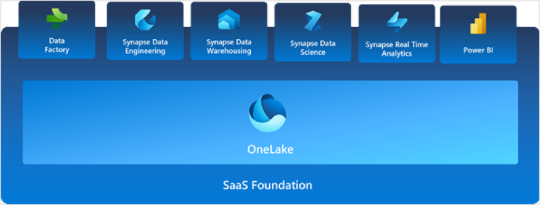
Microsoft Fabric brings together new and existing components from Power BI, Azure Synapse, and Azure Data Factory into a single integrated environment. These components are then presented in various customized user experiences.
Fabric brings together experiences such as Data Engineering, Data Factory, Data Science, Data Warehouse, Real-Time Analytics, and Power BI onto a shared SaaS foundation.
This integration provides the following advantages:
With the Microsoft Fabric SaaS experience, all the data and the services are seamlessly integrated. IT teams can centrally configure core enterprise capabilities and permissions are automatically applied across all the underlying services. Additionally, data sensitivity labels are inherited automatically across the items in the suite.
Fabric allows creators to concentrate on producing their best work, freeing them from the need to integrate, manage, or understand the underlying infrastructure that supports the experience.
Components of Microsoft Fabric
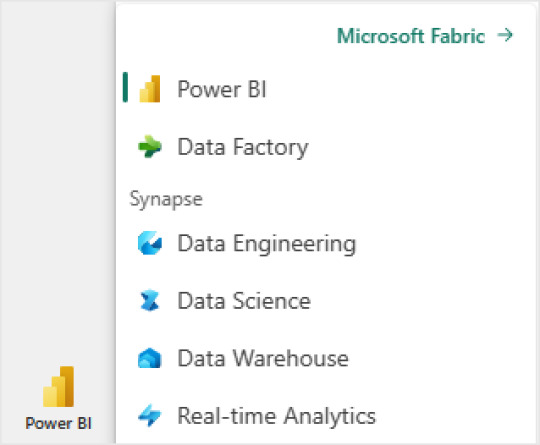
Microsoft Fabric offers the comprehensive set of analytics experiences designed to work together seamlessly. Each experience is tailored to a specific persona and a specific task. Fabric includes industry-leading experiences in the following categories for an end-to-end analytical need.
Fabric brings together all these experiences into a unified platform to offer the most comprehensive big data analytics platform in the industry.
Microsoft Fabric enables organizations, and individuals, to turn large and complex data repositories into actionable workloads and analytics, and is an implementation of data mesh architecture. To learn more about data mesh, visit the article that explains data mesh architecture.
OneLake and lakehouse – the unification of lakehouses
The Microsoft Fabric platform unifies the OneLake and lakehouse architecture across the enterprises.
OneLake
The data lake is the foundation on which all the Fabric services are built. Microsoft Fabric Lake is also known as OneLake. It’s built into the Fabric service and provides a unified location to store all organizational data where the experiences operate.
OneLake is built on top of ADLS (Azure Data Lake Storage) Gen2. It provides a single SaaS experience and a tenant-wide store for data that serves both professional and citizen developers. The OneLake SaaS experience simplifies the experiences, eliminating the need for users to understand any infrastructure concepts such as resource groups, RBAC (Role-Based Access Control), Azure Resource Manager, redundancy, or regions. Additionally, it doesn’t require the user to even have an Azure account.
OneLake eliminates today’s pervasive and chaotic data silos, which individual developers create when they provision and configure their own isolated storage accounts. Instead, OneLake provides a single, unified storage system for all developers, where discovery and data sharing is trivial and compliance with policy and security settings are enforced centrally and uniformly. For more information, see What is OneLake?
Organizational structure of OneLake and lakehouse
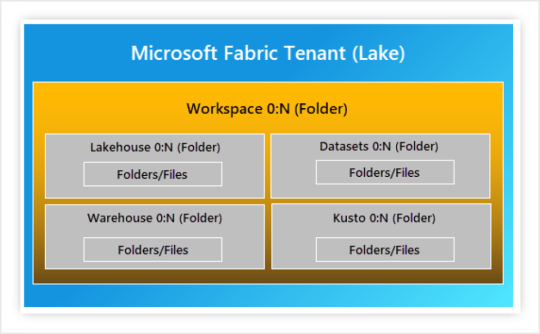
OneLake is hierarchical in nature to simplify management across your organization. It’s built into Microsoft Fabric and there’s no requirement for any up-front provisioning. There’s only one OneLake per tenant and it provides a single-pane-of-glass file-system namespace that spans across users, regions and even clouds. The data in OneLake is divided into manageable containers for easy handling. The tenant maps to the root of OneLake and is at the top level of the hierarchy. You can create any number of workspaces within a tenant, which can be thought of as folders.
The following image shows the various Fabric items where data is stored. It’s an example of how various items within Fabric would store data inside OneLake. As displayed, you can create multiple workspaces within a tenant, create multiple lakehouses within each workspace. A lakehouse is a collection of files, folders, and tables that represents a database over a data lake. To learn more, see What is a lakehouse?.
Every developer and business unit in the tenant can instantly create their own workspaces in OneLake. They can ingest data into their own lakehouses, start processing, analyzing, and collaborating on the data, just like OneDrive in Office.
All the Microsoft Fabric compute experiences are prewired to OneLake, just like the Office applications are prewired to use the organizational OneDrive. The experiences such as Data Engineering, Data Warehouse, Data Factory, Power BI, and Real-Time Analytics use Onelake as their native store. They don’t need any extra configuration.
OneLake is designed to allow instant mounting of existing PaaS storage accounts into OneLake with the Shortcut feature. There’s no need to migrate or move any of the existing data. Using shortcuts, you can access the data stored in Azure Data Lake Storage.
Additionally, shortcuts allow you to easily share data between users and applications without moving or duplicating information. The shortcut capability extends to other storage systems, allowing you to compose and analyze data across clouds with transparent, intelligent caching that reduces egress costs and brings data closer to compute.
Note: PreludeSys is a Microsoft Gold partner.
The original source of the content is learn.microsoft.com/en-us/fabric/.
#what is microsoft fabric#benefits of microsoft fabric#microsoft fabric consulting company#microsoft service fabric
1 note
·
View note